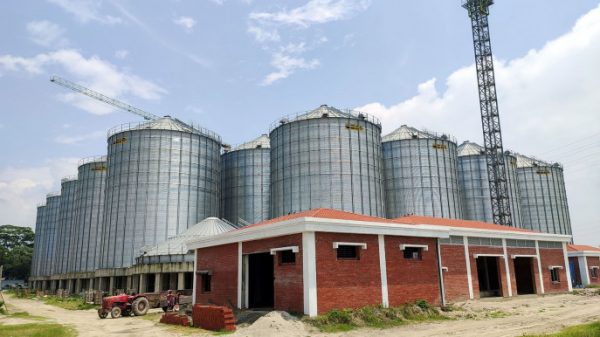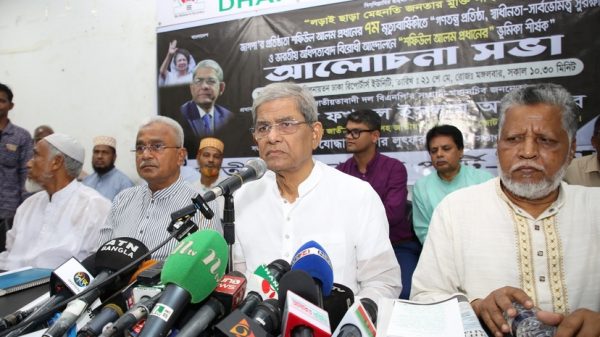Anomalies put food silo project in limbo

Shawdesh desk:
A critical food silo construction project has been plagued by a faulty feasibility study, design flaws, and contractor’s negligence.
The ambitious project, which aimed to construct eight food silos, remains less than halfway complete despite the project’s original deadline being over three years ago.
The World Bank, the project’s financier, has delayed fund releases due to the anomalies and discrepancies discovered during a recent inspection conducted by the Implementation, Monitoring, and Evaluation Division (IMED). As a result, the project’s cost has doubled, further exacerbating the situation.
Despite two time extensions and cost escalations, the project watchdog has expressed skepticism about the possibility of completing the project within the extended timeframe.
The project initially commenced in 2014, with a 2020 deadline. However, the deadline was extended twice, with the latest extension set until October of this year.
The estimated project cost has also skyrocketed, jumping from Tk 19.20 billion to Tk 35.69 billion. While the World Bank has contributed Tk 35 billion towards the increased cost, Tk 650 million is being sourced from the state coffer.
The project faced a significant setback when a previously selected site in Dhaka, along the bank of the River Buriganga, had to be abandoned due to the discovery that construction was not feasible due to planned infrastructure development in the area. Consequently, the project was relocated to Naogaon, resulting in a reduction in the number of silos from eight to seven.
Moreover, construction work on the Ashuganj silo has remained suspended for an extended period. The IMED report highlights the destruction of valuable equipment as assembly and installation have become impossible due to a lack of skilled manpower.
The watchdog observed that people have been deprived of important service like food security even after three years into the project’s original time because of the contractor’s intentional negligence.
It has recommended for taking action against the contractor according to public procurement rules (PPR) and at the same time it also asked Department of Food, the implementing agency, to play more responsible role.
“The information of IMED is not correct because it might have carried out the inspection much earlier. So, the execution has been shown at a lower rate,” Food Secretary Ismail Hossain said.
However, he admitted that the department of food lacks proper experience and capacity in implementing such projects.
As a result, it had to depend on foreign consultants but did not get expected service from them, he said.
The World Bank also wasted much time in approving project design and fund disbursement and a project design is still awaiting the lender’s approval, the official informed.
“It is also true that the delay was created from the part of the contractor as well. Besides, imports were disrupted during Corona crisis. But initiatives have been taken to bring momentum to the project,” the official stated.
Bangladesh produces some 33 million tonnes of rice a year, but it has to face deficit of 1.2 million tonnes because of natural disasters and wastage at different stages.
Every year, the deficit has to be met through imports. But imports from the international market are not possible all the time, particularly in any crisis moment.
Sometimes, rice price sees a big jump in the international market. Bangladesh has to go through such a bitter experience after the cyclone Sidr in 2007. Disruption in supply sometimes puts its food security at stake.
Against this backdrop, the ministry of food took the initiative of constructing eight food silos across the country to enhance its food storage capacity by additional 5,35,500 tonnes of rice and wheat during any disaster.
Out of the eight modern steel silos, six were meant for rice storage and two for wheat storage. It is possible to store food grains for up to three years in such silos.
Dhaka, Narayanganj, Chattogram, Mymensingh, Tangail, Khulna, Barishal and Ashuganj were selected as the preliminary sites for the modern steel food silos.
Moreover, small sized household silos were supposed to be distributed among five lakh families in flood-prone 63 upzilas of 19 districts under the project. There were some other such activities in the project.
Citing fault in feasibility study, IMED in its observation has said the lowest rate in the tender was much higher than mentioned in the development project proforma (DPP) to which the World Bank made an objection in providing additional project financing.
Although the World Bank finally agreed to give the additional funds, project authorities had to ensure no objection from the lender in getting every procurement package approved. Besides, the contractor firm did not carry out project work following the work plan.























Leave a Reply